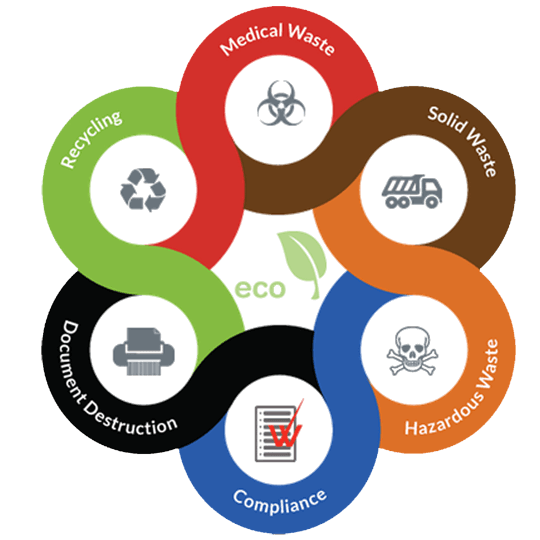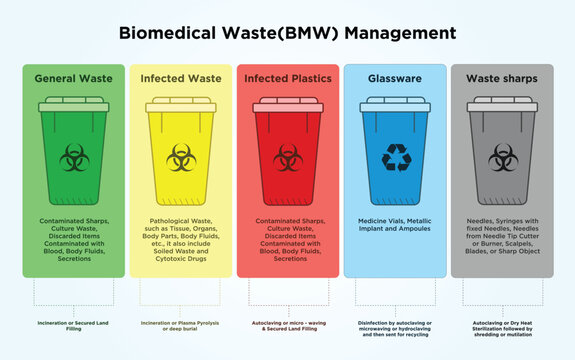Eco-Friendly Solutions for Medical Waste Removal: Focusing On Safety and Conformity
The Importance of Effectively Managing Medical Waste
Proper monitoring of clinical waste is of utmost importance in medical care facilities. The handling, storage, and disposal of medical waste call for strict adherence to standards and laws to make sure the safety and security of individuals, healthcare workers, and the environment. Incorrect monitoring of medical waste can posture serious health and wellness dangers, including the transmission of transmittable diseases and injuries from sharp items. Poorly disposed of clinical waste can have harmful results on the environment, polluting water sources and soil. Health care centers have legal and governing responsibilities to properly handle clinical waste, and failure to comply can cause fines and lawful repercussions. By executing ideal methods for safe handling and disposal of clinical waste, health care specialists can reduce these risks and contribute to a more secure and much healthier setting for all. Sufficient education and training on waste administration are crucial for medical care professionals to accomplish their duties around.
Health And Wellness Threats Connected With Improper Waste Monitoring
Inappropriate management of medical waste postures considerable wellness threats to both healthcare workers and the general public - WasteX Medical Waste Disposal. Clinical waste, that includes sharps, transmittable materials, pharmaceuticals, and radioactive materials, requires appropriate handling and disposal to avoid the spread of infections, injuries, and exposure to harmful substances
Among the main health and wellness risks associated with incorrect medical waste management is the transmission of contagious illness. Medical care employees who enter contact with contaminated waste may get illness such as HIV, liver disease, or other bloodborne microorganisms. Similarly, if medical waste is not appropriately thrown away, it can infect the environment, water sources, and even food, bring about the spread of conditions within the area.
Incorrect waste administration can additionally bring about injuries, particularly from sharps such as needles, scalpels, and broken glass. Accidental needle punctures can lead to the transmission of bloodborne diseases, while cuts from sharp items can trigger severe wounds and infections.
In addition, the incorrect disposal of pharmaceutical waste can bring about the contamination of water materials. When expired or extra medicines are flushed down the commode or disposed of inappropriately, the chemicals can seep into water sources, impacting marine life and possibly entering the human food cycle.
Ecological Influence of Poorly Disposed Medical Waste
Among the considerable effects of insufficient administration of clinical waste is its damaging impact on the atmosphere. Incorrectly disposed clinical waste postures a severe risk to environments, water bodies, and the overall equilibrium of the setting. WasteX Medical Waste Disposal. The harmful products had in clinical waste, such as contagious agents, pharmaceuticals, and chemicals, can infect water, air, and dirt, bring about widespread contamination and degradation
When clinical waste is not appropriately segregated, treated, and disposed of, it can find its means right into water bodies via inappropriate garbage dump techniques or prohibited discarding. This can result in the contamination of groundwater and surface area water, impacting marine life and possibly contaminating alcohol consumption water resources. The launch of harmful chemicals and drugs into the setting can interrupt ecological communities and harm both animal and plant species.
Additionally, incorrect incineration of clinical waste can release poisonous pollutants, consisting of furans and dioxins, into the environment. These contaminants have been connected to numerous health concerns, including breathing issues, reproductive conditions, and also cancer cells. The release of greenhouse gases during incineration additionally contributes to environment change.
To mitigate the ecological impact of improperly disposed clinical waste, it is important to apply correct waste administration techniques. This includes segregation of waste at the resource, proper therapy techniques, and risk-free disposal strategies. By doing so, we can lessen the contamination and safeguard the setting from the dangerous consequences of clinical waste mismanagement.
Regulatory and legal Responsibilities for Medical Care Facilities
In order to address the ecological impact of poorly disposed medical waste, medical care centers are called for to comply with regulatory and lawful commitments. These commitments are established to make certain the proper handling, storage, transport, and disposal of medical waste in a environmentally responsible and safe manner.
One of the vital legal responsibilities for healthcare centers is to acquire the needed licenses and licenses for managing clinical waste. This consists of getting a waste generator recognition number and complying with government, state, and regional regulations. Healthcare centers must likewise keep thorough documents of the types and quantities of clinical waste created, as well as the approaches utilized for its disposal.
Furthermore, healthcare facilities should carry out appropriate partition and packaging procedures for various kinds of medical waste, such as sharps, infectious waste, and pharmaceutical waste - medical waste removal service. This includes making use of leak-proof containers, biohazard bags, and sharps containers that meet regulatory requirements
Medical care centers are also responsible for making sure that their personnel receive ideal training on the correct handling and disposal of medical waste. This consists of training on infection control, personal safety devices, and waste management methods.
Ideal Practices for Safe Handling and Disposal of Medical Waste
To make sure the safe handling and WasteX Medical Waste Disposal disposal of clinical waste, health care centers must implement best techniques. These techniques are important to safeguard the health and wellness of both medical care workers and the public. The correct monitoring of medical waste is crucial in protecting against the spread of infectious illness and decreasing ecological contamination.
Among the most effective practices for safe handling and disposal of clinical waste is partition. Healthcare facilities ought to divide different kinds of clinical waste, such as sharps, infectious products, and pharmaceutical waste, to avoid cross-contamination. Proper labeling and shade coding of waste containers likewise play an important function in ensuring the correct segregation of clinical waste.
An additional essential ideal method is making use of appropriate containers for saving and carrying medical waste. These containers should be watertight, puncture-resistant, and appropriately secured to stop any type of feasible release of unsafe products. In addition, health care centers ought to establish clear methods for the collection, storage space, and transportation of clinical waste to decrease the risk of exposure and contamination.
Additionally, health care centers must educate their team on the correct handling and disposal of clinical waste. Routine training sessions and correspondence course should be performed to keep medical care workers upgraded on the most up to date standards and policies. This will assist guarantee that everybody included in the process knows the prospective threats and is furnished with the essential understanding and abilities to handle medical waste safely.
Education And Learning and Training for Medical Care Professionals in Waste Monitoring
Health care professionals call for comprehensive education and training in waste management to ensure the appropriate handling and disposal of clinical waste. The monitoring of medical waste is an essential component of medical care procedures as it straight affects the health and wellness of both medical care workers and the basic public. Proper education and training gear up medical care specialists with the required expertise and skills to handle and dispose of medical waste in a risk-free and eco liable manner.
Education and training programs for health care experts in waste management cover a series of topics, including the classification and partition of medical waste, correct packaging and transportation, storage space and labeling needs, and using personal safety tools. These programs additionally emphasize the relevance of adherence to regional, national, and international laws and standards controling medical waste monitoring.
By receiving detailed education and training in waste administration, health care specialists can efficiently minimize the threats connected with medical waste, such as the transmission of transmittable conditions and the prospective harm to the setting. WasteX Medical Waste Disposal. Trained experts can determine and execute finest techniques that advertise sustainability and efficient waste management methods within health care centers.
Constant education and learning and training in waste management ought to be a continuous priority for health care specialists, as waste management practices and policies might advance in time. By remaining updated with the newest growths in waste monitoring, health care experts can make certain that they are outfitted with the knowledge and abilities essential to make enlightened choices and add to the overall enhancement of waste monitoring techniques in health care settings.

Verdict
To conclude, proper administration of medical waste is essential to minimize health and wellness dangers and reduce the ecological effect. Medical care facilities have lawful and regulative obligations to make certain safe handling and disposal of medical waste. Following best practices and offering education and learning and training for health care experts in waste management are necessary for keeping a healthy and risk-free setting. By adhering to these guidelines, health care centers can protect public wellness and maintain the honesty of our ecological communities.

Healthcare specialists call for comprehensive education and training in waste administration to make certain the proper handling and disposal of medical waste - medical waste removal. The administration of clinical waste is a crucial component of health care operations as it directly influences the health and wellness and safety of both healthcare employees and the basic public